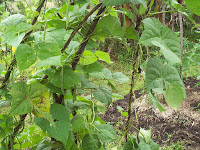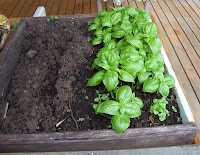
Right outside my house is Bill's garden. When he isn't working at the hospital or working out, he is usually outside working in the garden. Like the mail, nothing stops him - not rain, or snow, or sleet or hail (okay, we don't get the last 3, but the rain surely doesn't stop him.) Thankfully, I am up in the mornings, so when he is out at 0600 with the rototiller, it doesn't bother me. He grows a lot of vegetables and supplies the missionaries and others on the station with produce. Thankfully for him, due to my likes and dislikes, this neighbor doesn't raid his garden too often. I am thankful that he grows cabbage and pineapple, but I also enjoy the lettuce, onions, and peppers. He also grows beans, peas, bananas, squash, zucchini, tomatoes, carrots, and more.
The other day I had to ask him a question and found him with dead bean s in his hand. I commented on these beans looking rotten, only to learn that this was his source of seed that would be used to plant new beans. John 12:24 "I tell you the truth, unless a kernel of wheat falls to the ground and dies, it remains only a single seed. But if it dies, it produces many seeds." This led to Gardening 101 for Erin, and a sermon for him to share at the recent pastor's conference. Since I know very little about gardening, I was happy to learn. I learned about seed planting, compost, barrets, crop rotation, and knowing how to tell r
s in his hand. I commented on these beans looking rotten, only to learn that this was his source of seed that would be used to plant new beans. John 12:24 "I tell you the truth, unless a kernel of wheat falls to the ground and dies, it remains only a single seed. But if it dies, it produces many seeds." This led to Gardening 101 for Erin, and a sermon for him to share at the recent pastor's conference. Since I know very little about gardening, I was happy to learn. I learned about seed planting, compost, barrets, crop rotation, and knowing how to tell r ipe vegetables. I paid special attention to how to grow more cabbage and pineapple for when he is gone on furlough.
ipe vegetables. I paid special attention to how to grow more cabbage and pineapple for when he is gone on furlough.
 s in his hand. I commented on these beans looking rotten, only to learn that this was his source of seed that would be used to plant new beans. John 12:24 "I tell you the truth, unless a kernel of wheat falls to the ground and dies, it remains only a single seed. But if it dies, it produces many seeds." This led to Gardening 101 for Erin, and a sermon for him to share at the recent pastor's conference. Since I know very little about gardening, I was happy to learn. I learned about seed planting, compost, barrets, crop rotation, and knowing how to tell r
s in his hand. I commented on these beans looking rotten, only to learn that this was his source of seed that would be used to plant new beans. John 12:24 "I tell you the truth, unless a kernel of wheat falls to the ground and dies, it remains only a single seed. But if it dies, it produces many seeds." This led to Gardening 101 for Erin, and a sermon for him to share at the recent pastor's conference. Since I know very little about gardening, I was happy to learn. I learned about seed planting, compost, barrets, crop rotation, and knowing how to tell r ipe vegetables. I paid special attention to how to grow more cabbage and pineapple for when he is gone on furlough.
ipe vegetables. I paid special attention to how to grow more cabbage and pineapple for when he is gone on furlough.He has made little nursery boxes, and uses these to start the new plants as they grow from seed. Once they start to g row, they get replanted into the garden. I learned the secret of a good garden - compost. He has a compost pile in the garden, where a bunch of the missionaries throw away our pipia (rubbish). This then decomposes and turns into great soil for the nursery boxes and other areas of ground which need some nourishment.
row, they get replanted into the garden. I learned the secret of a good garden - compost. He has a compost pile in the garden, where a bunch of the missionaries throw away our pipia (rubbish). This then decomposes and turns into great soil for the nursery boxes and other areas of ground which need some nourishment.
 row, they get replanted into the garden. I learned the secret of a good garden - compost. He has a compost pile in the garden, where a bunch of the missionaries throw away our pipia (rubbish). This then decomposes and turns into great soil for the nursery boxes and other areas of ground which need some nourishment.
row, they get replanted into the garden. I learned the secret of a good garden - compost. He has a compost pile in the garden, where a bunch of the missionaries throw away our pipia (rubbish). This then decomposes and turns into great soil for the nursery boxes and other areas of ground which need some nourishment. One of the  unique things about gardening in PNG is the amount of rain that falls. If your plants are ground level they will soon be drowning in water after one rain. So the PNGers dig barrets (ditches) which collect the rain water and divert it from the crops. This works, as does planting on mounds which are elevated above the ground. Crop rotation was also part of my lesson. I don't remember all the the plants that are nitrogen adders and depleters, nor do I know how he remembers what was planted where and when, but he does. This enables him to rotate the crops accordingly to keep the soil from being depleted of all it's resources. If it does get depleted, the compost helps to restore some of them.
unique things about gardening in PNG is the amount of rain that falls. If your plants are ground level they will soon be drowning in water after one rain. So the PNGers dig barrets (ditches) which collect the rain water and divert it from the crops. This works, as does planting on mounds which are elevated above the ground. Crop rotation was also part of my lesson. I don't remember all the the plants that are nitrogen adders and depleters, nor do I know how he remembers what was planted where and when, but he does. This enables him to rotate the crops accordingly to keep the soil from being depleted of all it's resources. If it does get depleted, the compost helps to restore some of them.
 unique things about gardening in PNG is the amount of rain that falls. If your plants are ground level they will soon be drowning in water after one rain. So the PNGers dig barrets (ditches) which collect the rain water and divert it from the crops. This works, as does planting on mounds which are elevated above the ground. Crop rotation was also part of my lesson. I don't remember all the the plants that are nitrogen adders and depleters, nor do I know how he remembers what was planted where and when, but he does. This enables him to rotate the crops accordingly to keep the soil from being depleted of all it's resources. If it does get depleted, the compost helps to restore some of them.
unique things about gardening in PNG is the amount of rain that falls. If your plants are ground level they will soon be drowning in water after one rain. So the PNGers dig barrets (ditches) which collect the rain water and divert it from the crops. This works, as does planting on mounds which are elevated above the ground. Crop rotation was also part of my lesson. I don't remember all the the plants that are nitrogen adders and depleters, nor do I know how he remembers what was planted where and when, but he does. This enables him to rotate the crops accordingly to keep the soil from being depleted of all it's resources. If it does get depleted, the compost helps to restore some of them. Josh, your dad says "Hi," and would appreciate an email from you when you have a chance.